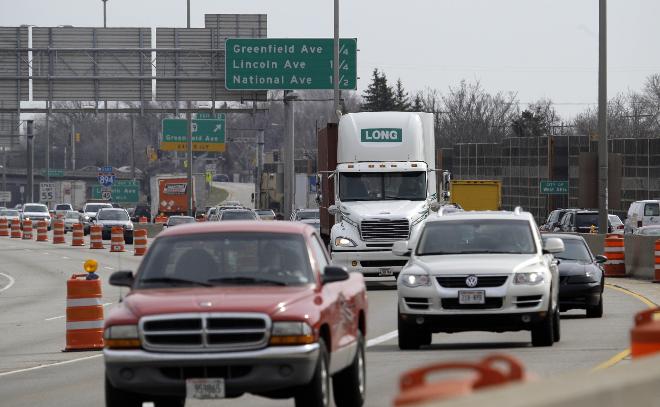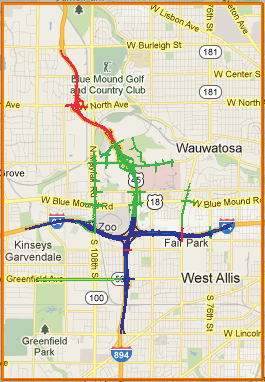In the politically polarized Milwaukee region, there are two widely divergent visions of what transportation should do.

There's the Waukesha vision, which might be summarized as all highways, no transit. This suburban Republican stronghold -- one of the most conservative counties in the country -- has for years been systematically severing the already limited transit connections to its core city, Milwaukee.
Then you have the Milwaukee vision, which prioritizes transit, at least to the extent that it can. This is a city that tore down a highway before the feds were handing out TIGER grants to fund such projects. It is currently planning a streetcar project. In 2008, Milwaukee County voters elected to raise their taxes in order to expand transit options -- before the state legislature refused to authorize the collection of funds.
That should give you a sense of the transportation feuds in Wisconsin's largest metro area. The region's weak transit system is a key factor in Milwaukee's status as the nation's most segregated metro area. But in this battle, the Waukesha vision is generally winning -- and it's not that close.
There is no better example of where Wisconsin's transportation priorities lie under Scott "No Train" Walker than the Milwaukee Zoo Interchange megaproject. At $1.7 billion, it is surely one of the most expensive interchanges ever built (keep in mind this is a state that "couldn't afford" to operate passenger rail at $8 million a year). And guess who will benefit most from Wisconsin's massive road expenditure -- the transit riders in Milwaukee, or the super commuters from Waukesha?
This week, a civil rights group and an environmental group filed suit in federal court against WisDOT, alleging that the interchange project -- which contains no provisions for transit -- is in violation of Title VI of the Civil Rights Act. Title VI requires government agencies that receive federal funding to not administer it in a way that has a "discriminatory impact" on minority groups.
Thats exactly what Wisconsin's asphalt-only transportation policies do, says Dennis Grzezinski, an attorney for the plaintiffs, the Milwaukee Innercity Congregations Allied for Hope and the Black Health Coalition of Wisconsin. The groups are seeking to halt construction until a new plan can be developed that does a better job addressing environmental and equity concerns.
"We're pointing to this incredible imbalance between billion and billions spending on the highway system and the deterioration of the transit system," said Grzezinski. "That’s the sole means of transportation for a larger part of the Hispanic and African American communities. If we keep spending huge sums of money on highways, these groups are just going to be left behind in terms of health and education and work."

Milwaukee's transit system is facing service cuts and fare increases. Meanwhile, supposedly "broke" Wisconsin is undergoing a massive highway expansion campaign. The interchange is part of a plan for $6.2 billion in highway upgrades for the seven-county Milwaukee region, endorsed and championed by Walker, the self-styled fiscally conservative governor.
Milwaukee's environmental and civil rights groups have been complaining for years about an insidious highway bias among transportation agencies, but there hasn't been much response from planning agencies, Grzezinski said.
Grzezinski said his clients have no problem with the state rebuilding the Zoo Interchange, which was built in 1963 and is the most highly trafficked interchange in the state. It's the road widenings that have been tacked on, Grzezinski said, that seem so inequitable. The group thinks all the money that would be spent widening the roads should be transferred to transit. Grezezinski estimates that would amount to a few hundred million dollars, enough to restore bus service and avoid fare hikes, potentially.
WisDOT's plan, Grzezinski said, is "just about the most expensive approach they could have taken." The state has played down the new capacity aspects of the project. But the plan, he said, incorporates 19-foot shoulders, apparently so additional lanes can be added later, he said.
A spokewoman for WisDOT said only one of the road sections was adding a lane. She did say, however, that I-94 would have 18-foot interior shoulders, saying that was a fairly standard practice for the department.
"WisDOT builds the interchanges for a 75 year life and it is fiscally responsible to accommodate future changes to operations," said Lindsay Necci of WisDOT. "The larger shoulders are also built to accommodate traffic during construction."
WisDOT does not comment on ongoing litigation, she said.
Everyone acknowledges this is a large and complicated interchange. Set just outside the city of Milwaukee, it serves as the confluence of two interstate highways and a widely traveled state highway, seeing 350,000 daily vehicles.
But James Rowen, a former Milwaukee official and creator of the blog The Political Environment, says the state of Wisconsin has a very powerful road lobby, and that both Republicans and Democrats have been guilty of currying its favor. (Vice Presidential Nominee Paul Ryan's family made a fortune building roads through the state.)
The big expenditures have been even more glaring lately, given that Walker has taken some controverial, hard-line policy positions on the premise that the state is "broke." But the Milwaukee region already rates among the lowest in the country in congestion, according to the Texas Transportation Institute [PDF].
Meanwhile, Rowen says, the regional planning agency's own studies show the Zoo Interchange will only save commuters about five minutes for the $1.7 billion public investment.
"It’s just such a stupendous jaw dropping waste of resources to spend on moving a small group of people in their cars a little faster," Rowen said. "People have this sense of entitlement that they should live 20 miles from Milwaukee and should be able to commute downtown at freeway speeds without any delay."
"Here you have this state which claims to be broke, we certainly don’t have any money for transit but we can take this federal money and borrow to the hilt for this freeway plan."





